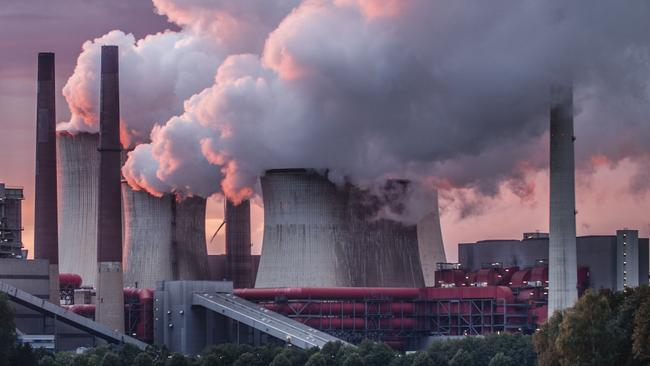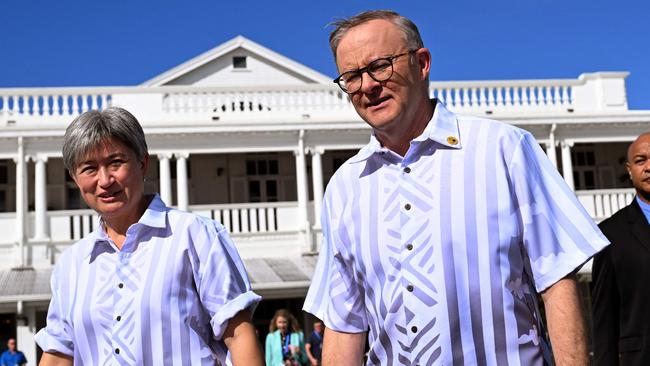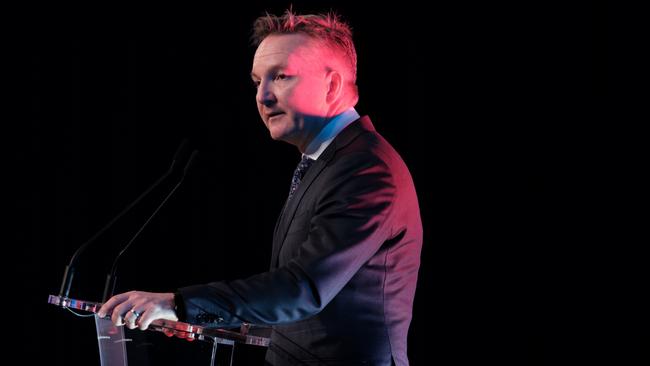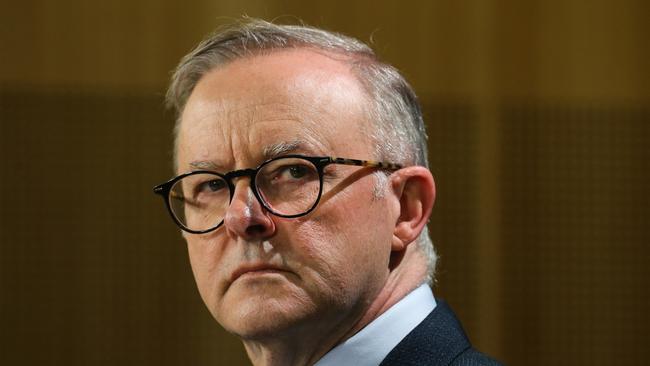Labor goes global with climate power struggle
The government is doubling down on renewable energy as it ties climate change to national and energy security.

It is climate change action where the new Albanese government is leaving its early mark. It faces the immediate test of its election mandate in the parliament – a measure that seeks to lock in Labor’s more ambitious climate targets and entrench by law a new approach to emission-reduction politics and decision-making.
Climate Change and Energy Minister Chris Bowen calls his bill “simple yet powerful”. It will underwrite the global campaign – in the Pacific, with the US and with European nations – waged by Prime Minister Anthony Albanese as proof of Australia’s re-positioning on climate policy and the recruitment of climate action as a weapon in national security and foreign policy.
In a few short weeks, Albanese, with deputy PM Richard Marles and Foreign Minister Penny Wong, has tied together Labor’s 43 per cent emissions-reduction policy with the strategic goal of ensuring Australia remains the “security partner of choice” in the Pacific. Once established, this nexus can only be decoupled at immense cost to Australia’s goal of seeking regional support against China.
There’s a big message for the Coalition. Any pledge it makes about a domestic climate policy retreat will come at the cost of Australia’s strategic interests. The politics are being rewritten by strategy.
After the Pacific Islands Forum this week, Albanese said his bid to co-host with the Pacific a global Conference of the Parties in 2024 that would involve the attendance of world leaders had been supported by every Pacific leader – yet Albanese knows such climate diplomacy will intensify pressure on Australia to lift its target.

In response to questions, he began using a different language, saying what matters is “global action” (not just what Australia does) and referenced Australia’s resources profile – meaning, like Canada, that our transition is “far more difficult”. He’s right. Expect to hear more such realism. The message on the government’s climate bill is that Labor won’t budge on its mandate – it won’t succumb to pressure from the Greens and teals to do more.
Yet the global backdrop is wild and unpredictable. Russian President Vladimir Putin is bent upon an escalating energy war and shortages to smash the will of NATO’s backing for Ukraine. Many nations, driven to panic, are reverting to coal power and reigniting shut-down coal plants.
There are reports China might lift its ban on Australia’s coal exports. Countries are searching for gas supply outside Russia, and are looking to Australia for assistance.
US President Joe Biden, having boasted that “America is back” on climate, has failed to get his signature climate legislation through the congress. Biden risks a US political humiliation. America’s 2030 emission targets look in doubt and the President, in a major reversal, will ask Saudi Arabia to boost its oil supplies. Facing high inflation, the risk is that Biden will face political extinction before Putin.
Amid growing global uncertainty from the Ukraine war, energy supplies, prices and strategic consequences, the Albanese government is holding firm. Bowen’s message is that Labor’s support for renewables is “even more important than before” because they are the cheapest form of energy and the “one source that no geopolitical situation can interrupt”.
Asked how important it was for Australia to keep its nerve and champion its renewables game plan, Bowen said: “This is extremely important. It is what every sensible government is now saying around the world. Yes, we have some short-term challenges – but renewable energy is more secure, there is no geostrategic crisis that can impact on the supply of sun to our land and wind to our shores.”

Labor won’t be swayed into any coal revisionism. Its position was backed this week by executive director of the International Energy Agency Fatih Birol, who told the Sydney Energy Forum: “The world has never witnessed such a major energy crisis in terms of its depth and its complexity. I believe we might not have seen the worst of it yet.”
Branding as “absolutely wrong” claims that clean energy policies had worsened the crisis, Birol warned against fresh investments that lock in fossil fuels for the long run. His message was that nations must stick by their transition to renewables. This is Labor’s song sheet.
But the transition is racing towards us with a life of its own. The recent report from the Australian Energy Market Operator has coal-fired generation shutting down even faster than previously announced timelines – it now says 60 per cent of current coal capacity will be withdrawn in the eight years to 2030. AEMO said: “Competition, climate change and operational pressures will intensify with the ever-increasing penetration of firmed renewable generation.”
Can we cope? Asked how confident he was of Australia’s transition, Bowen told Inquirer: “I’m very confident because we have to do this. Here you have AEMO, a world class operator, laying out the road map, yet there are still some people in the political debate second guessing it.”
Labor seeks to deliver what AEMO calls “a once-in-a-century transformation”. Its 43 per cent emissions reduction by 2030 involves renewable energy being 82 per cent of the National Energy Market by the decade’s end. This is a steep transition on a path littered with obstacles. Ultimately, the cheapness of renewables will flow into consumer prices – but how long that takes and how high prices will rise in the interim is a political time bomb for Labor feeding into the inflation threat.
Bowen’s bill will be the first test of the new parliament and of Labor’s mandate. By locking in Labor’s target, future governments will be bound unless they change the law. But its significance runs beyond 2030.
This is a structural change to climate decision-making.
It puts into law that the Climate Change Authority must publish progress against the targets and advise on future targets including the 2035 target, likely to be decided this term. It requires the minister to report annually to parliament on meeting the targets which Bowen likens to the annual Closing the Gap statement on Indigenous issues. “This is a framework not just for 2030 but the road map goes beyond that to 2035 and to 2040,” Bowen said.
The aim is to shift the politics and decision-making – this will seriously limit the Coalition’s scope to impose a more modest climate agenda in future. As Bowen said, the aim is “to provide an appropriate amount of certainty for business and investors”. These guidelines will shape domestic and international investment. Building brick upon brick, Labor seeks to create by law, process and investment a climate-change policy its conservative opponents will find hard, almost impossible, to unravel.
“We have both the resolve and expertise to take this on,” Albanese said this week. Bowen has made clear Labor doesn’t need the legislation since it can implement the policy anyway. But the legislation will make a difference. Labor intends to press the issue and test the parliament – the Coalition, the Greens and the teals.
The fate of the Climate Bill will shape the politics of the coming term. Passage of this legislation would constitute an empowering event for Labor. Any vote against the legislation by Greens and teals will come with a big political price, as Albanese signalled this week.
Bowen repudiates suggestions Labor’s targets are a walk in the park. “I point out that 2030 is just 90 months away,” he said. “That’s not long for this massive economic transformation.”
The Greens, drunk on hubris after their election success, have talked their book too much. They face a “lose-lose” result. If they vote for the bill, they will have folded before Labor pressure, something Greens cannot stomach. But if they vote against the bill, they earn the “wrecker’s” label for a second time after their 2009 sinking of Rudd’s policy and give the teals – assuming they have the nous – the chance to become the responsible climate change activists.
The Peter Dutton-led Coalition won’t vote for the bill. That’s a bridge too far. Meanwhile, Labor is working furiously to integrate its climate policy with allies and neighbours, in further complications for the Coalition.

Arriving for the Pacific Islands Forum in Fiji, Albanese declared there was “no challenge more important than climate change”, and after the meeting said Australia’s new climate change policy was “particularly well received” in every discussion he conducted.
Labor’s insistent message has been extra climate infrastructure for Pacific leaders as it mocks and discredits what it calls the Pacific “stuff-up” of the Morrison Coalition government.
Wong reported “a sense of relief” at Labor’s climate policy from her Pacific counterparts. Pacific leaders will always ask Australia to do more. But everyone knows this change is meaningful. International Development and Pacific Minister Pat Conroy said Labor’s 43 per cent target “will be a challenge from where we are now, but we will get there”. Albanese said after the forum meeting he was not asked to stop future fossil fuel projects, but Labor’s high profile on climate change guarantees this demand will be heard both from the Pacific and at home.
Speaking from Washington, Marles had a dual message: Labor wants to make climate change “a pillar of the alliance” since Labor sees it as “a national security issue”, and the government recognises that for Pacific leaders climate change is more important than geostrategic troubles (code for China). Once again, all roads lead back to the parliament. Will the parliament respect Labor’s mandate or repeat its destructive negativism of the past decade?
This week’s Sydney Energy Forum with an international cast highlighted the strategic risk in the shift to renewables – China’s overwhelming dominance as a supplier of the materials for clean energy. This was a theme of the meeting where the earlier alarm of the Morrison government has extended to the Labor government.
Global energy guru Daniel Yergin told the forum the road to net zero at 2050 was strewn with problems – getting in place the materials, critical minerals, solar panels and wind turbines to deliver the industrial revolution needed.
The conference was told China produces about 90 per cent of the rare earth minerals necessary for clean energy generation. IEA chief Birol said China currently makes 80 per cent of the world’s solar panels, and that is set to rise beyond 90 per cent. US Secretary of Energy Jennifer Granholm said she worried China “has bigfooted a lot of the technology and supply chains that could end up making us vulnerable”.
Granholm said: “We’ve seen what happens when we rely too much on one entity for a source of fuel, and we don’t want that to happen. It is imperative that nations that share the same values develop our own supply chains.”
These are fine words invoking an entirely new strategic principle that it surely here to stay. But it’s hard to implement in the march to net zero and surely even more costly. How do nations co-operate to check China’s overbearing market dominance?
This is the Ukraine war lesson applied to a potential future with China. In Europe, it is a harsh reality foreshadowing a harsh winter. Russia is already deploying gas retaliation to a range of European nations, with Poland, Bulgaria, Finland, Italy and Austria being hit. The French government is preparing for a total shut-off; the situation is most dire for Germany with its heavy dependence on Russian gas that it has now pledged to eliminate down the track.
Bowen agreed with Granholm. “Any country having that much market dominance would be a challenging issue,” he said. “It’s important for all of us to look at ways we can expand supply chains of renewable technology.”
Bowen said the Quad energy ministers agree on this principle; energy policy is being devised against China rivalry. Bowen and Granholm signed an Australia-US Net Zero Technology Partnership to promote clean energy technology and co-operate on a range of critical supply chains as both nations move to decarbonisation. The Dutton-led Coalition, presumably, will follow this closely. It represents a deepening in the link made by Scott Morrison as PM between climate policy and energy security.
It constitutes a warning to Australia. Our coal and gas made us an energy export superpower that has enjoyed supply security but the dilemma now opens up: how does Labor guarantee that its drive to renewables doesn’t expose Australia as hostage to future Chinese coercion on energy?
Bowen is unyielding. He said recently that he recognised the road to net zero “is going to be bumpy but I’m not particularly surprised by that”. He remains an optimist. He doesn’t think the current global energy crisis will result in backsliding on emissions reduction “because I think countries around the world get that the transformation is more important than before”.
The transformation Labor seeks was spelt out in the recent AEMO report, with its chief executive Daniel Westerman saying: “To maintain a secure, reliable and affordable electricity supply for consumers through this transition to 2050, investment is required for a nine-fold increase in grid-scale wind and solar capacity, triple the firming capacity (dispatchable storage, hydro and gas-fired generation) and a near five-fold increase in distributed solar.”
AEMO is explicit: gas-fired generation will play a crucial role as coal-fired generation retires. The pace of change in Australia’s energy sector is only going to accelerate. Whether our political system can manage the change is unknown. The central problem will be ideologues from left and right peddling their slogans. What is needed is rational analysis and the ability to change policy as the facts change.








Amid a deepening global energy crisis and rising prices, the Albanese government is doubling down on renewable energy as the centrepiece of its response, with its pending Climate Change Bill designed to transform emission-reductions policy in Australia for the long run.